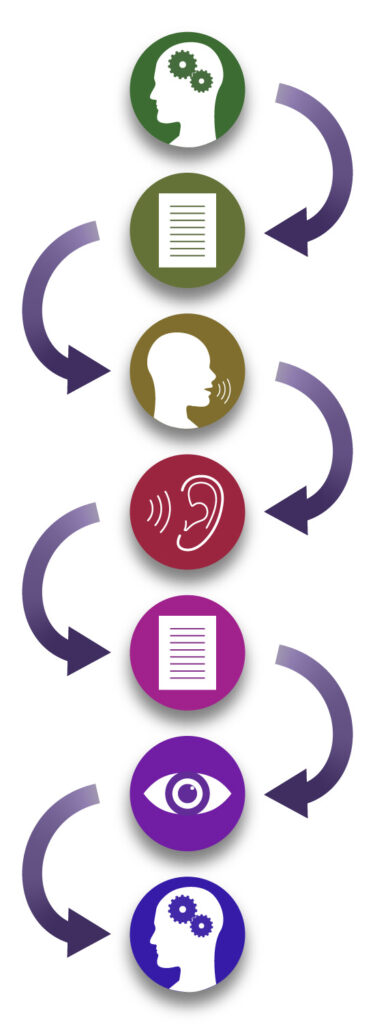The first class I attended in the spring of my sophomore year at Princeton was for a course called Philosophy 201, Introduction to Logic. Because this course was required for philosophy majors, the lecture hall was packed. The professor, who had taught this course many times before, mounted the podium and looked out at the crowd of students. “I don’t know what you’re all doing here!” he said. “If you were logical, you would have elected one person to come and take notes and share them with the rest of you.”
He was joking, of course. But his comment opened my eyes to the strangeness of the way we were being educated: The professor draws on his knowledge of a topic to prepare a lecture (or, in this case, dusts off a canned lecture he’d already prepared years before). Referring to his notes, he recites this lecture to a room full of students who listen to his words and summarize them in a new set of notes. The students then go back to their dorm rooms and, by reviewing their notes, try to reconstruct the original body of knowledge that the professor had encapsulated in a lecture.
Not only does this process appear crazily inefficient; it also is virtually guaranteed to distort the message, as in a game of telephone. The idea that I, as a student, would walk away with the same understanding that the professor had when he prepared the lecture seemed improbable at best. We do know that writing things down with a pen and paper reinforces learning, but we have no way of knowing whether what the student is writing is accurate, or whether notes that seem clear while listening to the lecture will make equal sense when the student reviews them later on.
And yet, the custom of lecturing in the classroom lives on. Technically, it would be more efficient for a professor to write down what he or she wants to communicate (as most of them have, in articles and books), and have students read the written material. Students might even be required to copy out particularly important passages by hand, as they often were in centuries past. But we all know instinctively that such a process wouldn’t work.
Let’s acknowledge the obvious objection that a teacher who communicated solely through writing would disadvantage those students whose primary learning modality is auditory. (This issue wouldn’t even have come up when I was at Princeton, since the concept of learning modalities hadn’t yet been developed in the 1970s.) Regardless, I think the importance of lecturing goes much deeper than that.
The ritual of having a respected person get up and speak in a dedicated space has its own significance, apart from what the person says. It invites attention. It lends weight and importance to the message, and flavors it with the history and personality of the speaker, in a way that written material does not. It allows the speaker’s delivery to be influenced by audience response, whether overt (through laughter or applause) or tacit (through body language or even the atmosphere in the room), thereby creating a feedback loop. Even when the speaker writes on the blackboard or whiteboard, the words have an immediacy that they don’t have in a printed book. These elements contribute to learning beyond what language itself can communicate.
These thoughts come to mind because it’s the time of year when the president of the United States delivers the annual State of the Union address. I’ve rarely bothered to watch the live event — it’s enough for me to read the press accounts afterwards of what the president has said. The delivery of the address is just a formality, since the script has been so carefully engineered that any vestige of spontaneity is lost, and it’s been distributed to the press even before the president gets up to speak. I never saw the point of watching the president’s mouth move as he recites the scrolling words on the teleprompter.
But it occurs to me now that the way the speech is staged — in the august halls of Congress, with the most powerful figures in the federal government present and all of the media watching — is what gives the address significance beyond the written words that constitute it. Even if I don’t watch the speech itself, it’s still the gravity of the occasion of its delivery that makes the words feel important when I read them later in the news reports.
It’s astonishing how different a lecture or a speech is from, say, a series of tweets, even if the content is the same.

Recent Comments